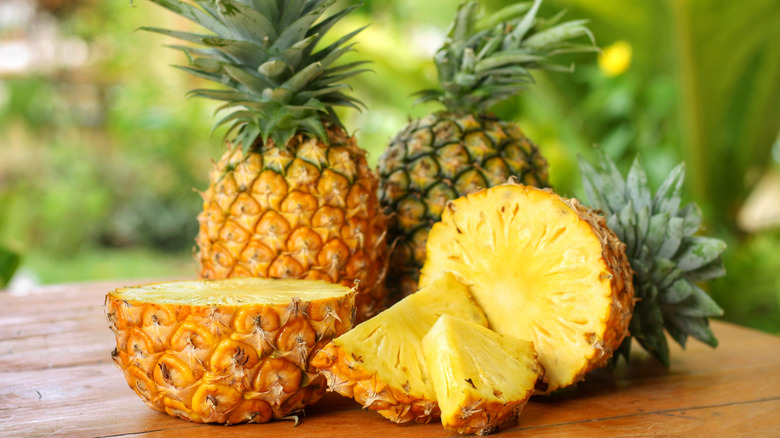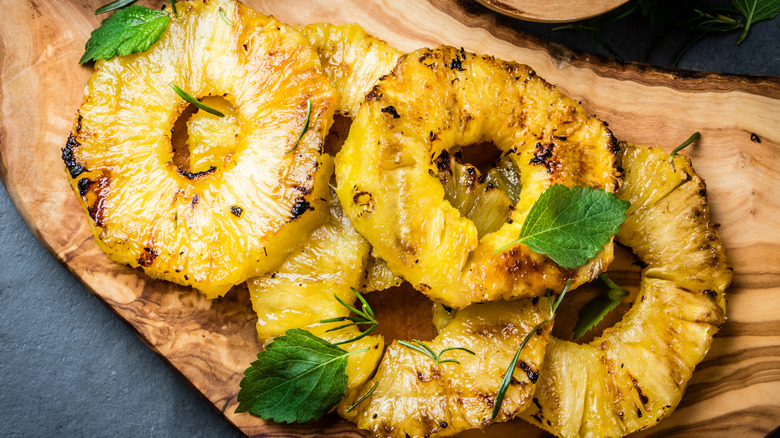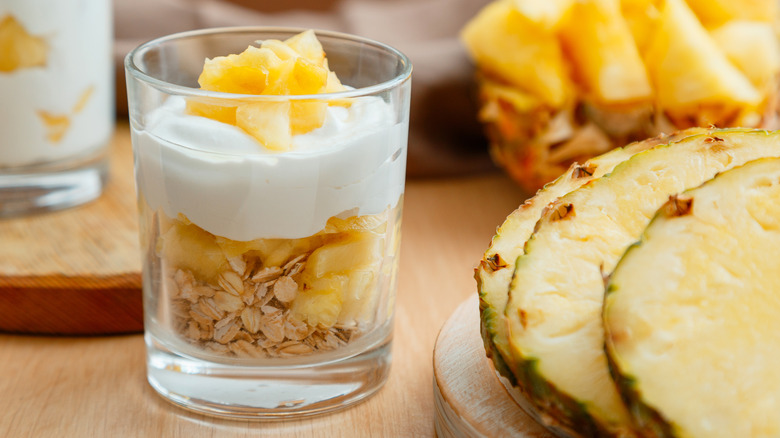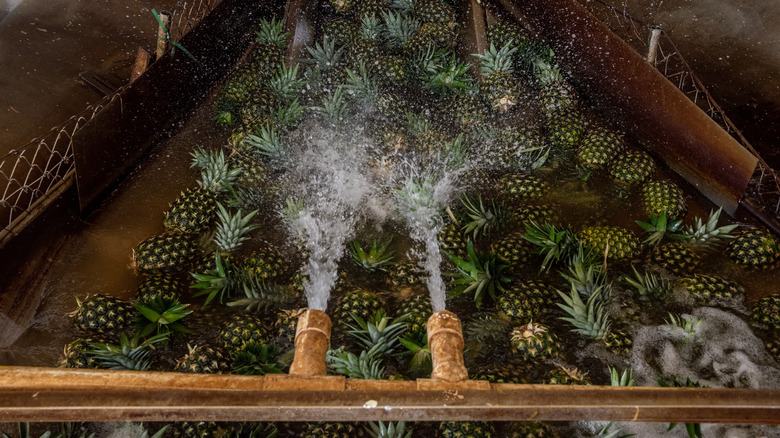How To Stop Pineapple From Burning Your Tongue
While it might not seem obvious or prevalent, pineapple can be quite a divisive fruit. Though pineapple is a sweet but acidic fruit that many people love, others might not be so much a fan because of one key symptom caused by the fruit. As it turns out, pineapple can essentially burn your taste buds due to a very specific type of enzyme known as bromelain.
When the enzyme touches your tongue and the rest of your mouth, it can cause a burning or pricking feeling because it cuts through the coating your mouth has. Luckily, there's no need to worry about the effect lasting too long — it will go away within a few hours and the normal feeling of your mouth should resume.
If you don't enjoy this sensation, there are several ways you can lessen the effects of pineapple on your mouth. First and foremost, you should always avoid eating the core of a pineapple, and even the edges of it, if you have a sensitive mouth. According to The Healthy, that's where most of the bromelain is found.
Exposing pineapple to heat neutralizes bromelain
If you love the taste of pineapple but hate what it does to your tongue, one way to keep pineapple enzymes from doing a number on your tongue is to cook it. Pineapples can be grilled, roasted, or blanched, and exposure to heat at levels of 158 degrees Fahrenheit or above causes the potentially trouble-causing bromelain to become dormant. You can consume as much canned pineapple as you want without burning your mouth because canned pineapple is sterilized in temperatures of 176 degrees Fahrenheit and above, which also destroys bromelain.
While blanched pineapple might not sound too appetizing, there is something to be said for grilling or roasting pineapple slices. Because pineapple is a naturally sweet fruit, cooking the fruit over high heat is a way to coax its juices out, and the effort will reward you with a caramelized treat. Once grilled, pineapple may be used as an ingredient in salads and salsa. You might also take inspiration from pineapple lovers in Brazil who toss pineapple spears or rounds with cinnamon and brown sugar before roasting the fruit, for a Latin American treat that's both sweet and spicy.
Serving pineapple in creamy dairy
Another way to keep the bromelain from bothering your tongue is to consume fresh pineapple with a creamy dairy like yogurt, crème fraîche, or ice cream. These items have milk proteins that interact with this rather aggressive enzyme, neutralizing it in the process. This is one reason why fresh pineapple smoothies made with yogurt or ice cream don't have the same acidic mouthfeel as fresh pineapple juice. When mixed with creamy dairy, fresh pineapple can even be enjoyed as part of a fruity parfait.
But the idea of mixing fresh pineapple may be a bit controversial, because bromelain is also known to make straight for milk proteins, potentially leaving you with a less creamy, more watery pineapple treat. Because of this, the best way to enjoy fresh pineapple with your creamy dairy may be to consume the dish as quickly as possible so that the chemical reaction doesn't ruin your dessert.
A salt water bath can make your fresh pineapple sweeter
Another way to keep this divisive enzyme from getting between you and your fresh pineapple is to have the fruit spend a bit of alone time with some salt, or have the fruit soak in a salt bath before tucking into it. And while it might sound like an old wives tale, food scientists like Drexel University assistant clinical professor of culinary arts and food science says there's a good reason to think why it works. He told Eating Well that salt activates bromelain, so that by the time you get to take a bite out of your pineapple, the enzyme should have run its course.
Another salt hack which is practiced in the Caribbean involves doing a spiral cut so the pineapple's eyes and skin are completely removed, and then salting the fruit, ensuring that the salt gets into every crevice. Once the salt has been rubbed in thoroughly, the fruit is washed to remove any excess.
Salt doesn't just neutralize the bromelain — it also manages to keep any bitter flavors that might be lurking in the pineapple at bay, leaving your fruit possibly sweeter than you expect.



